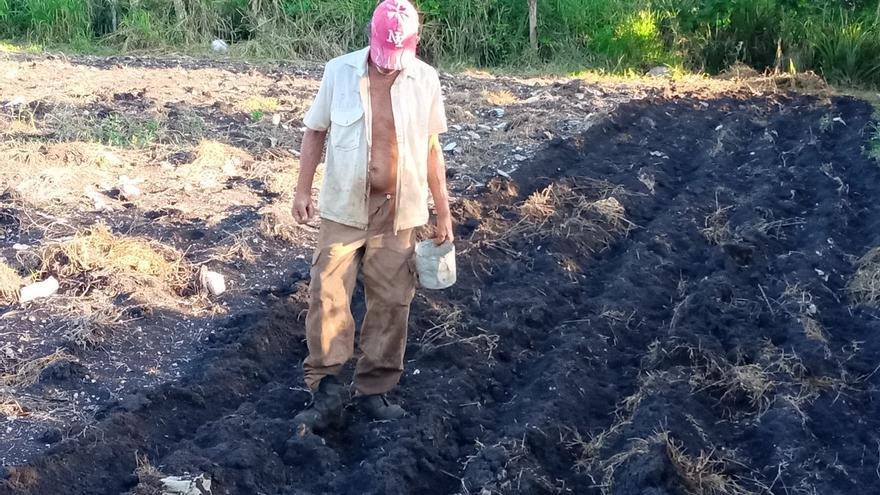
![]() 14ymedio, Havana, September 27, 2023 — Three independent organizations released a statement on Tuesday calling on the Cuban government to grant greater economic and market freedoms to address the structural crisis facing the country. The League of Independent Farmers, the Latin American Federation of Rural Women and the Independent Trade Union Association of Cuba also condemned the government for granting privileges to micro, small and medium-sized and businesses (MSMEs) — many of which operate simply as importers — instead of prioritizing domestic production to alleviate what they describe as a “famine” plaguing the island.
14ymedio, Havana, September 27, 2023 — Three independent organizations released a statement on Tuesday calling on the Cuban government to grant greater economic and market freedoms to address the structural crisis facing the country. The League of Independent Farmers, the Latin American Federation of Rural Women and the Independent Trade Union Association of Cuba also condemned the government for granting privileges to micro, small and medium-sized and businesses (MSMEs) — many of which operate simply as importers — instead of prioritizing domestic production to alleviate what they describe as a “famine” plaguing the island.
They claim MSMEs, which began playing a dominant role in the Cuban economy last year, are simply a mask that allows the government to pretend it is creating a market-oriented economy. “Nothing could be further from the truth. They are not a step towards economic freedom but rather another ruse to avoid it,” the statement reads.
The document also claims that the objective of this “fake private sector” is to avoid foreign sanctions on the state sector
The document also claims that the objective of this “fake private sector” is to “avoid foreign sanctions on the state sector,” specifically sanctions by the United States. In reality, officials have for years tried to financially strangle hundreds of private-sector businesses.
“MSMEs, have to go through a long approval and registration process that subjects them to ideological discrimination. They are not even the first step in the right direction… That would involve the creation of a genuine private sector and full respect for a basic set of freedoms,” the document states.
“We do not need food import companies like Gaesa [a business conglomerate run by the Cuban armed forces] and its MSMEs, but economic freedom to grow it in Cuba. Crushing agricultural producers while granting privileges to MSMEs is not the way to ensure the nation’s food supply. When the freedoms that we demand are respected here, the Cuban diaspora will be the primary initial investor in the reconstruction of a country with full rights,” the statement continues.
The organizations also point out that, in April 2020, independent Cuban farmers proposed five measures to guarantee food security. “None of the were adopted. Instead, more than sixty that proved unworkable were decreed,” they add. “This was acknowledged during the last session of the National Assembly. Today the specter of hunger haunts Cuban citizens.”
Among the measures being demanded of the state is the establishment of a title registry without “selective and exclusive authorizations” of lands, undertakings and private businesses; respect for the farmers’ authority over their lands, what they produce and the right to sell their production without state intermediaries; the freedom of each business to choose the investors, partners, employees and marketers it prefers, inside or outside the country; authorizing the private sector to participate in auctions on an equal and transparent footing; and the establishment of guarantees against expropriations, as well as the management of legal conflicts through an independent court.
“This crisis is, above all, the result of a failed system of state control that hinders domestic economic freedom. This is not something that can be corrected through dialogue. Free expression, even on the Internet, is now impossible without running great risks under the new penal code. But it is our right and duty to do so,” explained the organizations, which also demanded the release of all political prisoners.
Some analysts, such as the Cuban economist Pedro Monreal, have also expressed concerns over the political nature of these companies. “MSMEs are not just businesses; they are political expressions,” claims Monreal in a post on X (formerly Twitter). “Even a partial and incomplete economic transformation involving dynamic new players has political ramifications in the sense that it suggests a redistribution of control over assets and income, which is one of the bases of power.”
No matter how you dress them up, MSMEs will always be perceived as a calculated risk by the politically powerful who authorized them.
“No matter how you dress them up, MSMEs will always be perceived as a calculated risk by the politically powerful who authorized them,” he claims.
Release of the document coincided with a meeting in Miama between seventy Cuban businesspeople living on the island and a group of Cuban-Americans trying to encourage Cuba’s private sector. Days earlier, during a visit to New York to attend the United Nations General Assembly, President Miguel Díaz-Canel met with a group of U.S. businesspeople to discuss “new business opportunities” in Cuba.
Several officials from the Cuban delegation reported, without providing further details, that the regime is considering allowing Cuban-Americans to own businesses on the island and, to this end, is preparing to adopt economic “transformations” to attract potential partners.
____________
COLLABORATE WITH OUR WORK: The 14ymedio team is committed to practicing serious journalism that reflects Cuba’s reality in all its depth. Thank you for joining us on this long journey. We invite you to continue supporting us by becoming a member of 14ymedio now. Together we can continue transforming journalism in Cuba.
